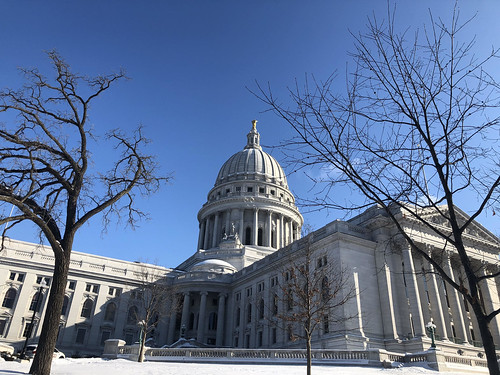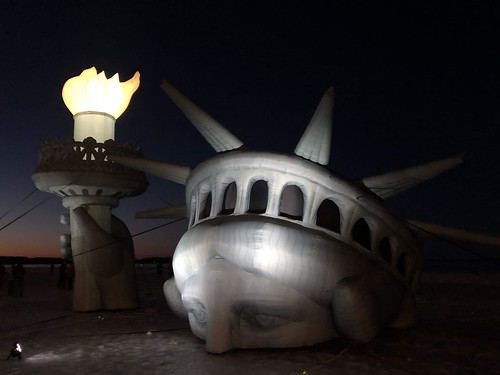It’s 11 PM on a Friday in early January and I just arrived outside my hotel in Chicago downtown, tired and jetlagged. It is dark, cold, and the wind blows a freezing breeze from the great lakes through Chicago’s streets. Doing normally my Ph.D. at the European University Institute in sunny Italy I asked myself: Is this the right time to go on an exchange in the American Midwest?
Chicago was only a brief stop-over on my way to Madison, the capital of Wisconsin. When I packed my suitcase for my Fulbright Schuman exchange at the University of Wisconsin at Madison, I still had the headlines of the previous year in mind – when the polar vortex brought the Arctic cold to Madison and pushed temperatures down to minus 37 degrees Celsius. So, I prepared myself accordingly. I packed everything that could keep me warm: a thick coat, scarves, gloves, and warm socks with special insulation.
Although I dreaded the cold temperatures, I realized quite quickly that there is something romantic about a very cold winter with lots of snow. Cold weather brings people together inside in cozy cafes or rustic bars. Winterly Madison might appear bleak at first glance – with its snow-covered houses and the frozen lakes that flank the city – but I found comfy cafes, homey bars, and delicious restaurants in abundance once I started discovering the city. Numerous places where you can drink local Wisconsin beers or have the famous cheese curds – deep-fried cheese, who doesn’t like that?
These places also offer you the chance of meeting and connecting with new people. In general, I experienced the people in Madison as very warm and welcoming. My landlady was very helpful and kind, picking me up from the bus stop and showing me around the city. I also got to meet a librarian who coincidentally worked also at my European university and who helped me settle in at my exchange campus. Furthermore, there is another advantage of a cold winter: you don’t mind spending your days inside the warm library keeping up with work. I spent incredibly productive days in the UW Madison central library where I conducted research on political communication. I also had the chance of connecting with scholars of the world-class communication and political science department of UW-Madison. There, I could present my work in front of interesting and ambitious grad-students and professors. The whole academic environment in Madison gave me new inspiration and provided me with a new perspective on my own field of research.
But this exchange was not only about work for me. I also wanted to discover the United States by traveling around the country. I spent weekends in Chicago or went snow-shoeing in Northern Wisconsin. This trip in particular provided me the chance of getting to know another side of America that is not the same as life in the big cities like Chicago, New York, or San Francisco. It is the rural part of the country, with large pick-up trucks, red barns, and Trump signs in the front yard. By talking to locals and reading up on this area in books, I learned what people feel and think about politics in this part of the country. I also learned about the deep divide between rural Wisconsin and the capital, Madison.
It was a unique chance for me to observe these political cleavages at first hand – phenomena that I study in my research in political science on a daily basis. I wished I could have discovered other parts of the country as well, but the COVID-19 crisis put an early end to my exchange. Nevertheless, my exchange to Madison provided me with new insights into the United States while providing new perspectives on my own work and research. I am very grateful for that.
TOBIAS WIDMANN IS A 2019-2020 FULBRIGHT STUDENT RESEARCHER IN POLITICAL SCIENCE AT THE UNIVERSITY OF WISCONSIN AT MADISON. HE IS ALSO A PH.D. RESEARCHER AT THE EUROPEAN UNIVERSITY INSTITUTE IN FLORENCE. HIS THESIS FOCUSES ON THE COMMUNICATION OF POLITICAL PARTIES AND THEIR STRATEGIC USAGE OF EMOTIONAL LANGUAGE. HE HOLDS A JOINT MASTER’S DEGREE IN POLITICAL COMMUNICATION FROM THE UNIVERSITY OF AMSTERDAM AND AARHUS UNIVERSITY AND A BACHELOR DEGREE FROM THE UNIVERSITY OF HEIDELBERG.
Articles are written by Fulbright grantees and do not reflect the opinions of the Fulbright Commission, the grantees’ host institutions, or the U.S. Department of State.



